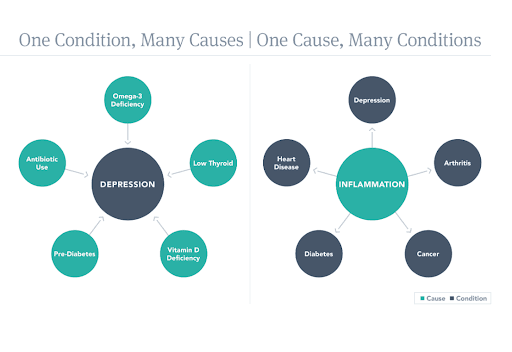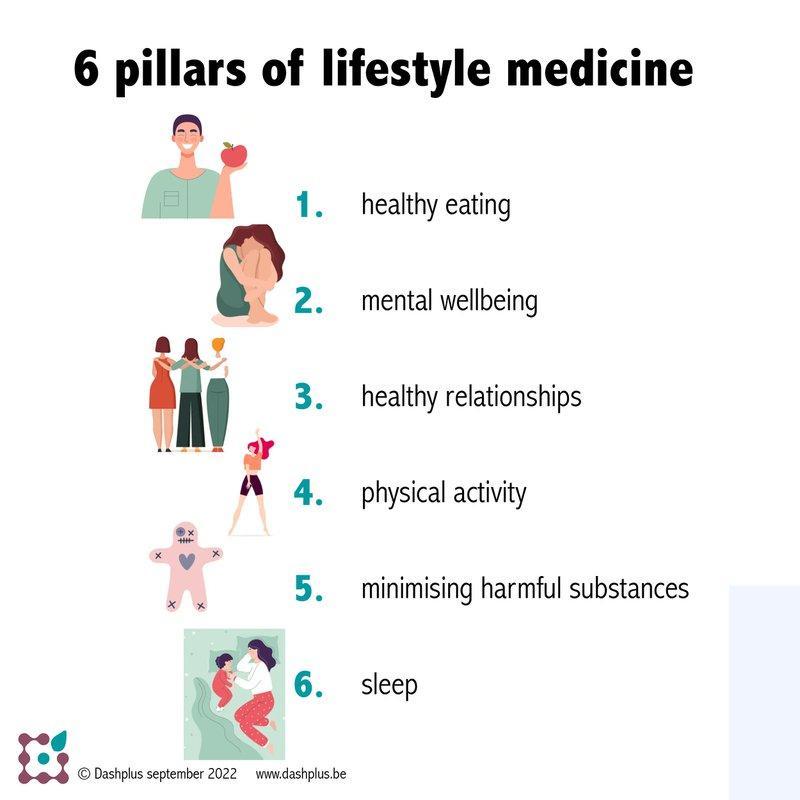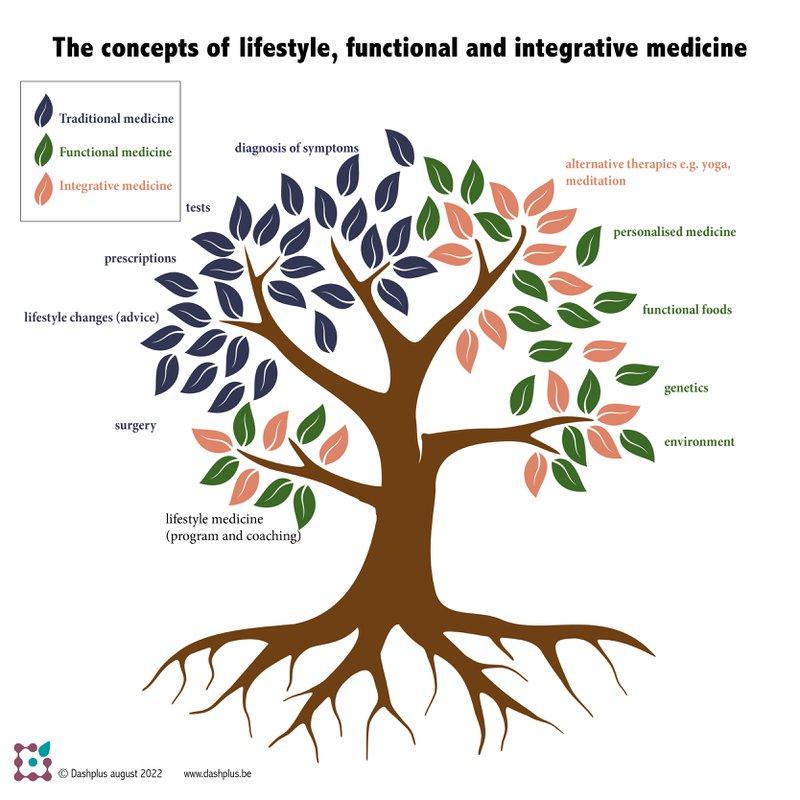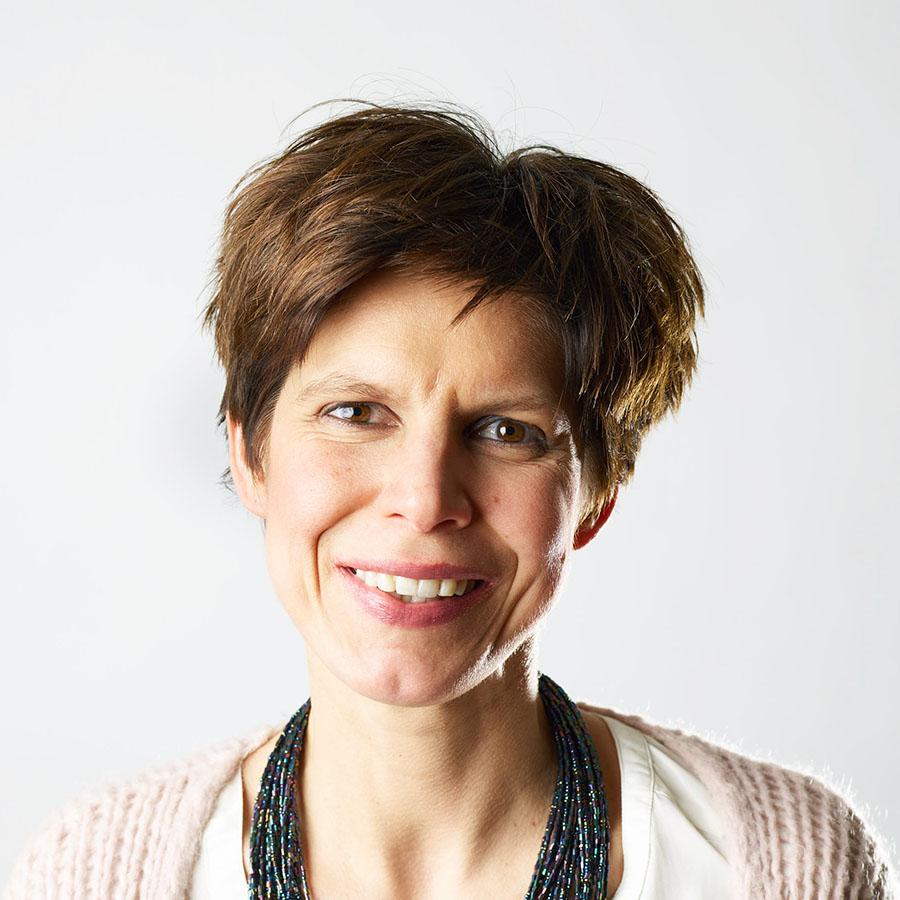Both functional and lifestyle medicine are becoming a hot topic across the world, especially since the covid pandemic. To illustrate: from March 2020 until March 2022 worldwide Google searches about functional medicine have more than doubled. It went from an average of 42 to an average of 100 searches.
The concepts of functional medicine and lifestyle medicine typically are situated within the field of preventive health. They are often used interchangeably although they are not the same. Exploring preventive health development, it’s important to know what we’re talking about.
So:
- what is functional medicine?
- what is lifestyle medicine?
- how are they related?
- and why are they important for innovators?
We try to explain it here.
-
Join +2000 health innovators
- Join +2000 health innovators
Functional Medicine: working on multifactor causes of chronic illness
Functional medicine is sometimes called ‘the future of conventional medicine’. In this perspective, conventional medicine starts from the symptom and its consequences and is mostly treated with surgery or prescriptions.
Functional medicine takes a wider view: it looks at the interactions between genetics, lifestyle choices, and environmental exposures. It uses the functional medicine matrix model, which incorporates 7 biological systems and clinical imbalances. Functional medicine considers a person as a whole: diagnosis and treatment is holistic and personalized to each individual.
Functional medicine tries to find the answer to the question ‘why is a person ill?’
It states that one condition can have many causes or oppositely, that one cause can have many conditions. In this model, a lot of attention goes to identifying and addressing the root cause of disease.

Functional Medicine aims to reverse ‘the chronic disease endemic’ and therefore first centers using functional medicine focus on chronic patients (like Cleveland Clinic in the USA). But of course, a functional and holistic medicine approach is useful for all patients.
This article from 2016 explains how functional medicine practice works:
- listening to the patient’s illness narrative on the initial intake
- Evaluating, prioritizing, and focusing on the patient’s modifiable lifestyle factors
- Organizing the patient’s clinical imbalances by underlying causes into a systems biology matrix framework; and
- Creating a therapeutic partnership between doctor and patient.
So, intensive tests are part of this biology-based approach to look for e.g. nutritional deficiencies, immune dysfunction, chronic inflammation, etc. . Treatment often focuses on nutrition and include lifestyle changes.
Lifestyle medicine: behaviors that can improve health and quality of life
We already indicated lifestyle interventions are part of the functional medicine treatment.
Lifestyle medicine is being defined as ‘‘the systematic practice of assisting individuals and families to adopt and sustain behaviors that can improve health and quality of life”
So it’s naturally linked to healthy lifestyle .
According to the European Lifestyle Medicine Organization- ELMO it’s a branch of evidence-based medicine using lifestyle changes to prevent, treat and reverse the progression of chronic diseases by addressing their underlying causes.”
Interventions in lifestyle medicine include: health risk assessment screening, health behavior change counseling, clinical application of lifestyle modifications, ect. .
Lifestyle medicine typically addresses 6 pillars:
- healthy eating
- mental wellbeing
- healthy relationships
- physical activity
- minimising harmful substances (drugs, tobacco, alcohol)
- sleep
Lifestyle medicine focuses more on preventing or treating chronic diseases solely through different types of lifestyle interventions and thus is used as a tool for the other (broader) concepts.

Integrative medicine: conventional in combination with alternative
Usually means: blending or integrating non-conventional therapies into care. It’s known for its combination of conventional (e.g. drugs, surgery & lifestyle changes) and complementary/alternative medicine that are not part of traditional Western medicine (e.g. chiropractic therapy, yoga, meditation) with a focus on maximizing wellness for people with chronic diseases.
-
Don't miss any innovations in healthcare
- Don't miss any innovations in healthcare
Did you know?
In Belgium, the university of Ghent, has opened their own integrative medical center. Through a biopsychosocial & multidisciplinary approach, this team mainly wants to focus on patients with ongoing physical complaints where no explanation ortreatment has yet been found.
What is the difference between conventional medicine, functional medicine and lifestyle medicine?
In brief, functional medicine is different from traditional medicine in that it regards a person as a system and looks for root causes of disease. Treatment focuses on lifestyle changes and mainly nutrition.
Lifestyle changes are part of functional medicine and when functional medicine is combined with alternative therapies like yoga, chiropractic therapy, ect, .. we name it integrative medicine.

What they have in common: the importance of tackling chronic disease
Although LM, FM and IM are interesting for everyone, they share a common goal: tackling chronic disease and bringing healthy lives to people.
It’s importance cannot be underestimated: the amount of diabetes, cardiovascular disease, and obesity across the globe have been hitting epidemic rates. According to the WHO:
- Lifestyle-Related Diseases (LRD’s) account for more deaths than all other diseases & are increasing worldwide.
- Non-communicable diseases (NCD’s) kill 41 million people each year, equivalent to 71% of all deaths globally
And there’s more:
- Over 85% of health care costs can be attributed to chronic health conditions
- Addressing lifestyle factors has the potential to reduce the burden of chronic disease to the health system, and increase quality-of-life and longevity in the individual. For example, the European Prospective Investigation into Cancer and Nutrition study , a cohort study of over half million participants during 15 years, demonstrated changes in lifestyle factors could prevent 93% of diabetes, 81% of heart attacks, 50% of strokes and 36% of all cancers (yes, take your time and let that sink in..) .
- In addition to LRD prevention, comprehensive lifestyle changes can reverse disease progression. When we address these root determinants of our health, we find that our bodies often have a remarkable capacity to begin healing themselves, and much more quickly than had once been thought possible.
One of the lessons of COVID worldwide is the importance of a healthy lifestyle. A healthy lifestyle not only proved to be important to cope with the circumstances of the pandemic, but also to prevent and cure the virus itself.
Why is this important for you?
- concepts like functional medicine, holistic medicine, integrative and lifestyle medicine (and others..) are all important within the growing field of preventive health. They are constantly used, but often with different meanings. Make sure you understand your peers when talking or communicating about them.
- make sure you know what expert(ise) you’re looking for: professionals can name themselves ‘coach’, therapist or doctor, but their expertise and target group can be very different. Healthcare organisations like hospitals start to invent in preventive health too
- digital and other technologies are highly useful for functional medicine, lifestyle medicine and traditional medicine. But they will need different functionalities.
- these ‘new’ fields of medicine will become ever more important in the years to come. Market segments of healthy food, sleep, physical activity, digital servicies will continue to grow. But there are still barriers to scale functional medicine in public health systems.
- make sure you understand the preventive health business ecosystem if you want to develop new products or services in this field
Check out all dashplus articles on lifestyle medicine and preventive health
We’ve made a content library of all our blogs about preventive health and you can find it here.
Thanks to Gianna V, co-author of this article.











